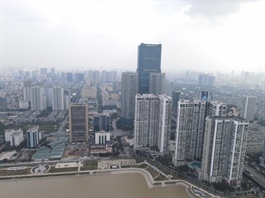Taxing second homes must be studied carefully: experts
Taxing second homes must be studied carefully: experts
The policy of taxing second homes should be introduced at an appropriate point in time with a carefully-studied roadmap and regime.

The property market of Viet Nam still lacks grounds to ensure that the tax would help prevent speculation and increase transparency, experts said.
In the draft resolution about specific mechanisms and policies for the development of HCM City recently submitted to the Ministry of Planning and Investment, the southern metropolis proposed to collect tax on properties that owners did not use directly or on second homes.
Although taxing second homes was expected to contribute to preventing speculation and making the market more transparent, the proposal triggered concerns that the policy might do more harm than good in the context that the property market was stagnant and there was a lack of a transparent market database.
Tran Minh Hoang, deputy general secretary of the Viet Nam Association of Realtors, said although taxing second homes was a must-do in the long run which was in line with international practices, it’s not the right time to apply the policy at the moment because the real estate market was facing difficulties.
The policy risked a market panic as investors might leave HCM City. Hoang said that the tax, if applied, should be applied across the country, instead.
He said that it was better to provide support for those who bought their first home rather than imposing a tax on the second homes.
Vo Hong Thang, deputy director of research and development at DKRA Group, said that the tax rates must be appropriate to ensure that the policy would work to prevent speculation. “Too high taxes will strangle the market,” he said, adding that the tax rates should be put into consideration with regard to the rental yields.
A detailed roadmap and regulations must be raised for the imposition of the tax on second homes, he said. For example, there should be regulation about how many square metre each family member could own then the tax should be imposed only on the excess area.
Duong Thuy Dung, director of CBRE Viet Nam, said that taxing second homes might cause a decrease in the liquidity in the short term as this policy would force investors to think about how to use the assets efficiently before making purchasing decisions.
Careful consideration
A number of things must be put into consideration to ensure the fairness and eligibility of the policy.
Thang Nguyen, advisor of law firm ACSV Legal, said that if the tax was not imposed on residents who lived in other localities but owned property in HCM City, it would be unfair to the residents of HCM City.
Exemptions should be given to those who had legitimate reasons to own more than one property or their properties were all used efficiently.
In addition, the same tax rate could not be applied to properties of different values, types and locations, he said, adding that the tax regimes, progressive or flexible, needed to be put into consideration.
Importantly, radical solutions must be raised to prevent tax evasion and avoidance as the market lacked transparency and digitalisation remained limited.
Housing prices in HCM City have skyrocketed due to a shortage of supply. Housing supply in HCM City dropped to the lowest level in many years as legal barriers are hindering the implementation of many projects, land funds has become limited, many projects are behind schedule and investment costs keep increasing.
The more radical solution was to tackle these bottlenecks to boost the housing supply in the southern city rather than imposing a tax which might put more of a burden on the market, experts said.
Economic expert Dinh The Hien said that the taxes on property owners in Viet Nam were not as strict as in many other countries and there was a fact that the real estate market was attractive to investors.
The tax should focus on properties that were not put in use to increase the efficiency of land use and limit the waste of resources, Hien said.
Sharing the same viewpoint, Le Hoang Chau, chairman of HCM City Real Estate Association, said that taxing second homes was in line with the Ministry of Finance’s intention about an asset tax.
Taxing second homes would prevent speculation, thus, prices would not be pushed up too high and the market would be more transparent, he said.
According to Alex Crane, CEO Knight Frank Vietnam, tax on property assets was imposed for a long time in many developed countries, forcing buyers to think twice.
The idea is good and the tax collection will increase the city’s budget which will ultimately be spent on developing the infrastructure system and public services, he said. However, the Government should consult the public widely.
He said Thailand and Singapore applied a similar tax but they had an efficient land registration system which made it easier for the implementation of the tax.
He pointed out that problems might arise from the lack of transparency in ownership.
The HCM City Institute for Development Studies said that the city should levy this tax only when the market was digitised and made transparent.






















